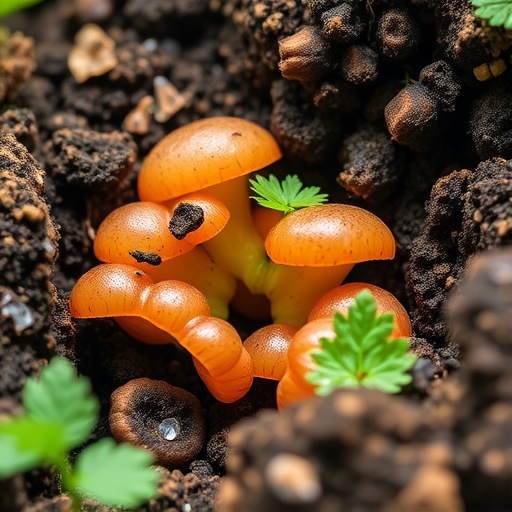
In an age where environmental sustainability is paramount, the quest for innovative solutions in waste management continues to gain momentum. A groundbreaking study has emerged from the hands of researchers Paventhan, Kavitha, and Kaleeswaran, focusing on the potential of vermicomposting and its acceleration through the incorporation of Zinc Oxide (ZnO) nanoparticles enriched with Citrus hystrix. This eco-friendly approach not only enhances waste decomposition but also holds promise for improving soil health and agricultural productivity.
Vermicomposting has long been recognized as a natural method to recycle organic matter through the works of earthworms. This process transforms food scraps, garden waste, and other biodegradable materials into nutrient-rich compost. However, there are often challenges associated with the efficiency of vermicomposting, including the speed of decomposition and the quality of the resulting compost. The research by Paventhan and colleagues directly addresses these issues, proposing a new solution that utilizes nanotechnology in organic waste management.
ZnO nanoparticles possess unique properties that enhance their utility in agricultural and environmental applications. Their high surface area and photocatalytic abilities make them effective agents for promoting growth and accelerating biological processes. In this research, the team investigates the integration of these nanoparticles into vermicomposting systems to observe any notable improvements. The study hypothesizes that Citrus hystrix, a plant known for its antimicrobial properties, combined with ZnO, might create an optimal environment for earthworms, intensifying their composting activities.
The experimental design of this study involved a series of controlled trials in which organic waste materials were subjected to different treatments. The innovative component of adding ZnO nanoparticles, enriched with extracts from Citrus hystrix, was meticulously managed to ascertain its effects on the composting process. Each variable was examined alongside key performance indicators such as the rate of decomposition, the activity level of earthworms, and the quality of the end product.
The findings from this research are nothing short of promising. Samples enriched with Citrus hystrix extract and ZnO nanoparticles demonstrated a significantly accelerated decomposition rate. The earthworm populations thrived in these enriched environments, which suggested a better interaction between the microorganisms present in the organic waste and the nanoparticles. This synergy not only enhanced the mineralization process but also reduced the time necessary for the composting cycle, subsequently leading to a more efficient waste management system.
Further analysis indicated that the quality of the compost produced in the enriched setups was superior in terms of nutrient content. High levels of essential macro and micronutrients were observed, fostering a more favorable environment for plant growth. It turned out that the presence of Citrus hystrix and ZnO not only spurred a rapid breakdown of materials but also enhanced the bioavailability of nutrients that are crucial for the health of subsequent crops.
This link between enhanced vermicomposting processes and agricultural benefits provides significant implications for farmers and gardeners. The traditional methods of composting can often be slow and labor-intensive. However, with the introduction of this innovative technique, the time and effort required for producing high-quality compost could be drastically reduced. This could incentivize more individuals to adopt sustainable practices in their gardening and farming endeavors.
The eco-friendly approach advocated by this study also highlights the importance of utilizing natural resources and minimizing the reliance on chemical fertilizers, which are often detrimental to soil health and the environment. By focusing on organic waste and enhancing the vermicomposting process with natural substances like Citrus hystrix and ZnO nanoparticles, this research paves the way for a paradigm shift in how we perceive waste and compost management.
Additionally, the investigation into the microbial dynamics during the composting process reveals a deeper understanding of the interactions within the ecosystem. The enriched environment created by the nanoparticles has been shown to support beneficial bacteria and fungi, which play vital roles in the decomposition process. This fine-tuning of microbial interactions can ultimately result in a more efficient conversion of waste into valuable compost, showcasing the delicate balance of ecosystems that exist within a pile of organic waste.
While the results undoubtedly present exciting avenues for future research, questions still remain regarding the scalability of this approach. How can the integration of ZnO nanoparticles on a commercial scale be managed? What are the long-term effects on soil health with continuous use? As researchers delve deeper into these topics, the findings laid out by Paventhan and his colleagues establish a solid foundation for further examination and larger-scale trials.
As society grapples with the dual challenges of waste management and sustainable agriculture, the insights gained from this research offer a glimmer of hope. The acceleration of vermicomposting through the use of Citrus hystrix enriched ZnO nanoparticles presents an eco-friendly alternative that could revolutionize how we manage our organic waste. With further validation and exploration, such methodologies may well become standard practice in agricultural communities aiming to enhance productivity while remaining environmentally conscious.
In conclusion, the study spearheaded by Paventhan and his team stands out as a significant contribution to the interdisciplinary fields of waste management, nanotechnology, and sustainable agriculture. As we continue our efforts towards a greener future, innovative solutions like this will play a crucial role in shaping practices that are not only effective but also sustainable and beneficial for generations to come.
Subject of Research: Acceleration of vermicomposting through Citrus hystrix Enriched ZnO Nanoparticles.
Article Title: Acceleration of Vermicomposting Through Citrus hystrix Enriched ZnO Nanoparticles: An Eco-Friendly Approach.
Article References:
Paventhan, S., Kavitha, P., Kaleeswaran, B. et al. Acceleration of Vermicomposting Through Citrus hystrix Enriched ZnO Nanoparticles: An Eco-Friendly Approach. Waste Biomass Valor (2025). https://doi.org/10.1007/s12649-025-03243-x
Image Credits: AI Generated
DOI: Not provided.
Keywords: Vermicomposting, Citrus hystrix, Zinc Oxide nanoparticles, Eco-friendly solutions, Waste management, Sustainable agriculture.
Tags: biodegradable materials decomposition accelerationCitrus hystrix in vermicompostingearthworm composting efficiencyeco-friendly waste management solutionsenhancing soil health with nanotechnologyimproving compost quality with ZnOinnovative agricultural productivity strategiesnanotechnology applications in environmental sustainabilityorganic waste recycling methodssustainable waste management practicesvermicomposting techniquesZinc Oxide nanoparticles in agriculture


